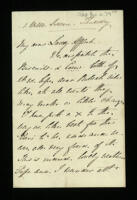Enjoying the Long Vacation in Cambridge, idleness banished from Cambridge, reading Thucydides and doing composition with Shilleto, weekly examinations in classics and mathematics
Re Edwin Atherstone. Printed copy of letter, 9 Feb. 1855, with copy reply, 13 Feb [1855].
'Geometry lecture notes'.
4 St Peter's Terrace, Cambridge. Undated [postmark: March 1904] - Concerning the anaphrodisiac quality of hemlock, with a transcript of an enclosure from W. E. Dixon to Professor Bradbury dated Mar. 17/04 confirming this.
Two letters concern his offer to supply the remaining volumes of his commentary on the Bible.
(Bibliog. 114).
D.107: 34pp. ms. draft.
D.108: Proofs, with ms. corrections.
Enclosing printed items re his work Lays of Other Lands.
Letters dated 1906, 1908, and 1914.
54 Cours Napoléon, Ajaccio, Corse - In the letter of 30 October, he is resigned to the fact that they will find a collaborator for Sir James and have their own requirements; refers to the reception of Lilly Frazer’s books at the local school; writes of Madeleine, recovering from typhoid fever, and her brother, who has just received a doctorate in law. In the letter of 29 Nov. he has agreed to organise the surveys for Varagnac for the Encyclopedie Françoise. In the letter of 12 Nov., he is glad to hear they will be at their club until the end of the year; thinks the translation by Madame Roth is ingenious, but it is hard to match the quality of Sir James’ verse. The achievement of 'The Fear of the Dead' is difficult if one cannot reread the documentation and though Frazer has a good memory he should have someone help who can find what he needs and read it to him. All three letters contain news of Martine [Giamarchi, a great niece].
Includes statement to the Academy of Political Science, New York, on 'European Reconstruction', 14 Nov. 1924
With a few copies of verse by others.
128: Letter from Robert Pemberton Milnes to William Constable Maxwell, [summer 1857]. enclosing verse, 'Ode to the Queen', written in 1854. Feared Indian Mutiny for years; Duke of Cambridge and Princes should have been sent to the colonies as rulers. Postscript: has acquired a book called The Convert through letter from Constable Maxwell's wife.
130: Poem by Robert Pemberton Milnes on the loss of Captain Wyvill's fortune in States Bank failure. [n.d.]
The fourth notebook of four into which G. N. Wilson copied chapters XII-XXI of Ramanujan's Notebook 2, catalogued as Add.Ms.b.105-107A. Envelope carries notes by B. M. Wilson.
Sans titreCorrespondence, 1963, 1966-1968. Geals was a colleague of Synge at the Rowett Research Institute.
![Three letters from 'Jack' [François Ceccaldi] to 'Flaminica' [Lady Frazer]](/uploads/r/trinity-college-library/0/2/c/02c9947c571bf3852520e326fc5b7cf2f3ece534c09b21c148330f6737cfa8d4/FRAZ.32.107-109_thumb.jpg)
